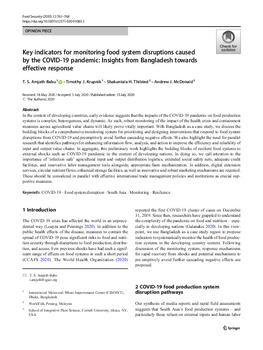Mostrar el registro sencillo del ítem
Key indicators for monitoring food system disruptions caused by the COVID-19 pandemic: insights from Bangladesh towards effective response
| Creador: | Amjath Babu, T.S. |
| Creador: | Krupnik, T.J. |
| Creador: | Thilsted, S.H. |
| Creador: | McDonald, A. |
| Año: | 2020 |
| URI: | https://hdl.handle.net/10883/20968 |
| Formato: | |
| Lenguaje: | English |
| Editor: | Springer |
| Copyright: | CIMMYT manages Intellectual Assets as International Public Goods. The user is free to download, print, store and share this work. In case you want to translate or create any other derivative work and share or distribute such translation/derivative work, please contact CIMMYT-Knowledge-Center@cgiar.org indicating the work you want to use and the kind of use you intend; CIMMYT will contact you with the suitable license for that purpose |
| Tipo: | Article |
| País de enfoque: | South Asia |
| Lugar de publicación: | New York (USA) |
| Páginas: | 761-768 |
| Número: | 4 |
| Volumen: | 12 |
| DOI: | 10.1007/s12571-020-01083-2 |
| Descripción: | In the context of developing countries, early evidence suggests that the impacts of the COVID-19 pandemic on food production systems is complex, heterogenous, and dynamic. As such, robust monitoring of the impact of the health crisis and containment measures across agricultural value chains will likely prove vitally important. With Bangladesh as a case study, we discuss the building blocks of a comprehensive monitoring system for prioritizing and designing interventions that respond to food system disruptions from COVID-19 and preemptively avoid further cascading negative effects. We also highlight the need for parallel research that identifies pathways for enhancing information flow, analysis, and action to improve the efficiency and reliability of input and output value chains. In aggregate, this preliminary work highlights the building blocks of resilient food systems to external shocks such as COVID-19 pandemic in the context of developing nations. In doing so, we call attention to the importance of ‘infection safe’ agricultural input and output distribution logistics, extended social safety nets, adequate credit facilities, and innovative labor management tools alongside, appropriate farm mechanization. In addition, digital extension services, circular nutrient flows, enhanced storage facilities, as well as innovative and robust marketing mechanisms are required. These should be considered in parallel with effective international trade management policies and institutions as crucial supportive measures. |
| Agrovoc: | COVID-19 |
| Agrovoc: | FOOD SYSTEMS |
| Agrovoc: | DISRUPTIONS |
| Agrovoc: | MONITORING |
| Agrovoc: | RESILIENCE |
| ISSN: | 1876-4517 |
| Revista: | Food Security |
Ficheros en el ítem
Este ítem aparece en la(s) siguiente(s) colección(ones)
-
Socioeconomics
Including topics such as farming systems, markets, impact & targeting, innovations, and GIS -
Sustainable Intensification
Sustainable intensification agriculture including topics on cropping systems, agronomy, soil, mechanization, precision agriculture, etc.

